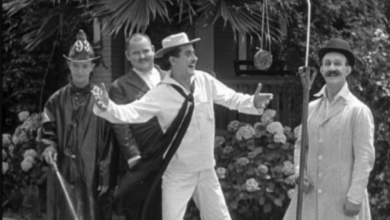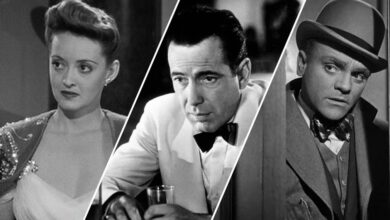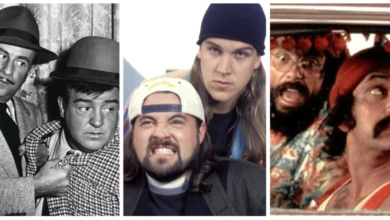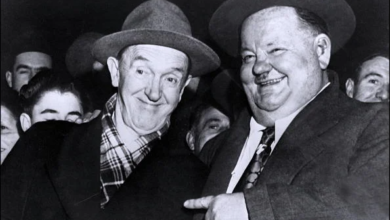The Greatest Marital Comedy Ever Made? Laurel and Hardy in “Sons of the Desert” (1933).
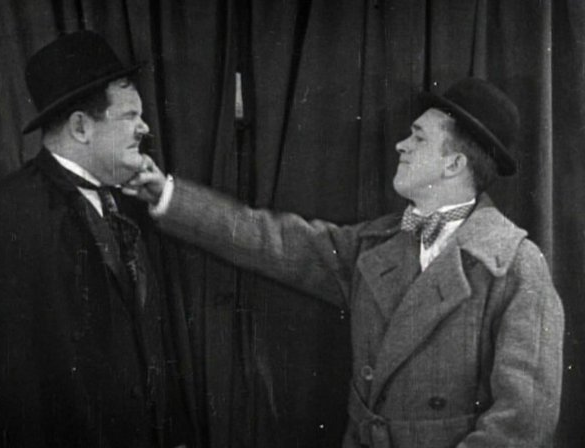
A few days ago I watched this again for the umpteenth time.
I smiled throughout.
I laughed out loud (on my own) frequently.
I spent the next day and a half singing “Honolulu Baby” to myself.
Now THAT’S the definition of a truly great film. In fact, I’d say that Sons of the Desert is the greatest marital comedy every made. It’s a film that deals with marital confusion and betrayal, but not conventional marital betrayal. At its heart is the question of where Stan’s ultimate loyalties lies, and whether or not there’s such a thing as an ultimate loyalty to the truth. Yet, Stan’s moral dilemma is not some pious distraction from the comedy – Stan’s moral dilemma is just about the funniest thing in the film. This is, I think, key to the greatness of Sons of the Desert – its most serious implications are also its most hilarious implications.
The “exhausted leader” of Stan and Ollie California branch lodge demands that everyone attend the convention in Chicago. Ollie’s wife Lottie (Mae Busch – never better – except perhaps in Come Clean – 1931) forbids it, having organised a healthy trip to the mountains. Stan and Ollie feign an illiness for Ollie and bribe a doctor (actually a vet) to say that Ollie needs a trip to Honolulu as a cover for their actual trip to Chicago. In Chicago they meet a tedious prankster (Charles Chase – who pulls off the Ricky Gervais/David Brent trick of making someone who is annoyingly unfunny – funny), who turns out to be Lottie’s brother and who actually gets Ollie on the phone with Lottie for just enough to arouse her suspicions. The liner that was supposed to be taking them home from Honolulu sinks. Stan and Ollie have arrived home too soon, and hide from their wives in the attic. Their wives, at first terrified for their spouses, learn of their betrayal while at the movies. When the boys actually arrive at the front door, Ollie concocts a bizarre “ship-hiking” explanation which Stan initially endorses before breaking down and confessing everything. “Honesty is the best policy” it turns out and Stan is caressed and treated by his wife while Ollie is soon surrounded by the shards of every single breakable object in the house.
The moment where the wives are in the cinema watching newsreel coverage of the convention and Stan and Ollie dance about and hog the camera still brings tears of hilarity to my eyes, just as it has done for decades, ever since I first saw it as a small boy. The dialogue in this film still crackles. The recurring notion that Stan may experience sudden shafts of genius that intermittently pierce the fogs of idiocy that habitually envelop him is well expressed.
Stan: I’ve certainly got to hand it to you, Ollie.
Oliver: For what?
Stan: Well for the meticulous care with which you have executed your finely formulated machinations in extricating us from this devastating dilemma.
Despite these moments of lucidity, this is a film in which Stan will still eat wax fruit from a bowl and take its indigestibility as a challenge rather than as an insuperable objection.
Elements of the plot are recycled from We Faw Down (1928). In all honesty, the elaborate miming that they had to perform in this silent short in order to reinforce Ollie’s lies is less effective than actual dialogue. It owes even more to Be Big (1931), which is the one chiefly devoted to getting Ollie’s boots on). Indeed, as Lottie urges Ollie to finally tell the truth, he is urged to “be big”.
Without ever being sentimental or moralistic, Sons of the Desert has a soul. It’s a film about redemption. Betty is convinced that if Stanley is confronted directly enough, he will confess. Arguably, Lottie’s rage at the end is as much about having been humiliated by Betty as anything else.
Stan and Ollie live with their wives in adjacent houses. Stan regularly gets confused as to which house is his. The houses are legally separate but the attic is shared – which is perhaps key to the relationships in this film. The film is unusual insofar as Stan affirms a marital loyalty which trumps male friendship. (There is a vulgar expression that’s relevant that would sour any discussion involving Stan and Ollie.) But more importantly, Stan makes a kind of decision for himself, which reinforces a general tendency I’ve noted throughout their later films that, at the end of the day, Ollie is more dependent on Stan than Stan is on Ollie.
I’ve thoughts about other Laurel and Hardy films.

